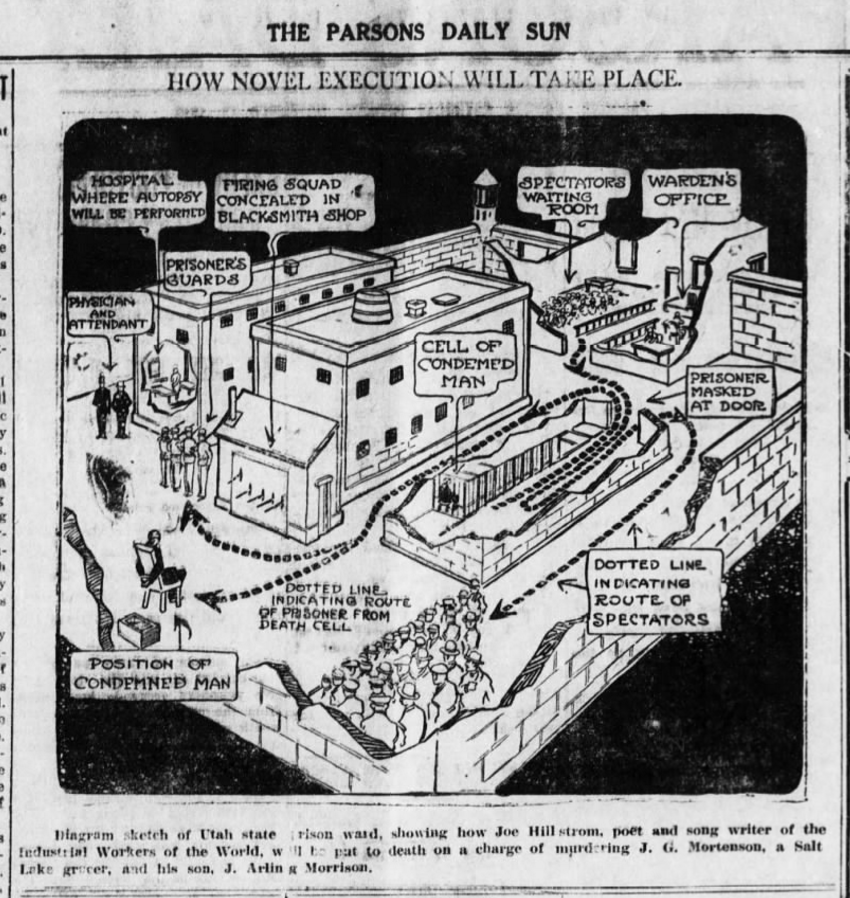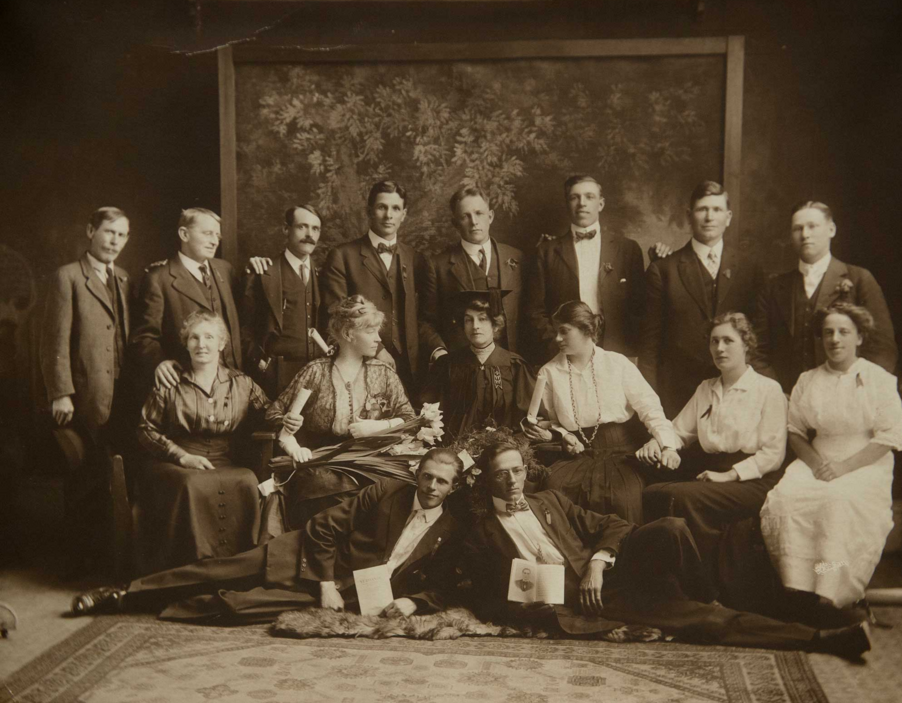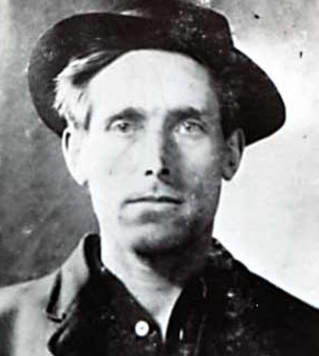-Joe Hill
Tuesday November 23, 1915
Salt Lake City, Utah-
Execution of FW Joe Hill Cost County $371.80

The men who were selected to shoot bullets into the heart of Fellow Worker Joe Hill will, apparently, be very well paid, for most of the nearly 380 dollars, allocated by the county for that purpose, goes to them. Pretty good pay for just a few minutes of work, if one does not mind being paid to put another human being to death.
The body of our Rebel Songwriter is now a train to Chicago and will arrive there this afternoon. A grand funeral followed by a march to the cemetery is being planned at I. W. W. headquarters in that city for later on in the week.
From the Deseret Evening News of November 22, 1915:
Hillstrom’s Execution Cost County $371.80
—–The board of county commissioners today authorized the payment of $371.80 to cover the expenses of the execution of Joseph Hillstrom. The main item of expense was the amount paid to the members of the firing squad.”
Wobbly: The Rough and Tumble Story of an American Radical
-by Ralph Chaplin
Literary Licensing, LLC, 2013
https://books.google.com/books?id=o8gmnwEACAAJ
Deseret Evening News
(Salt Lake City, Utah)
-Nov 22, 1915
http://newspaperarchive.com/us/utah/salt-lake-city/salt-lake-city-deseret-evening-news/1915/11-22/page-2
IMAGE
Joe Hill execution, Diagram sketch of Utah state prison yard,
Parsons (KS) Daily Sun, Nov 13, 1915
http://www.newspapers.com/image/63174433/
Governor Spry’s Spy Reports on Funeral of Joe Hill

Salt Lake, Utah,
Sunday, November 21, 1915.L. M. Reports:
Following instructions I went to the funeral of Joe Hillstrom which was held at O’Donnell’s undertaking parlors at 2:30 P.M. today.
A throng of people blocked the entrance, but I fought my way to the door which was locked and I found that only friends were admitted. However when two of his friends came rushing through the crowd, I followed them in without question, on the part of the door keeper.
I walked up to the coffin which was covered with flowers and red drapery and looked at the form of Hillstrom and silently cried with the few friends who were already there. One of the men patted me on the shoulders and told me to think how bravely he faced the cowards and guns that were leveled at him and for the sacrifice and devotion to his friends, that in those thoughts I could be comforted.
After viewing the remains I took my place among the mourners and engaged myself in a conversation with a lady who was Swedish. I told her of my being a perfect stranger having only been in town two hours, and I did not know where to stop and would like to be introduced to someone who could inform me of a good place; that I had come in town for the purpose of obtaining work and also to attend the funeral of Hillstrom. The woman seemed pleased with my ideas and was very ready to introduce me to leading members of the I. W. W. whose names were Child, Ed. Rowan, Paul Roudine, Bert Larson, Hedrick and Brennan, all of whom were very nice to me and asked me to join them in their singing which I did.
Services were opened by neither prayer nor singing. Mr. Child, chairman of the committee, spoke pathetically and told how their fellow workman had been murdered by gunmen hired by the authorities of Utah; after which he introduced Mr. Faulkener of Denver. The latter spoke of being shocked to the marrow when he learned of the permitted murder, the shameful treatment and the injustice to Hillstrom, stating that this alone did not satisfy the raw hearts of the authorities, but they kept on publishing untruths about the murdered man. He also expressed his gratitude toward Hillstrom for not wanting a minister to console him to the end. He brought out points to show that Hillstrom was more spiritual than any priest, Minister or bishop in Slat Lake. In closing his remarks, he read the last will of Hillstrom which was greeted with approval by his friends.
“Senator” Lund spoke of being a friend of the working people and stated that he would like the working class to stand back of him in an effort to abolish capital punishment..At the close of his remarks, the Swedish Choir sang one of Hillstrom’s own songs “There is a power in the union.” I helped sing this, and we sang while crowds of people marched past the coffin. Most of these were curious spectators who were not allowed inside until the services were over.
Oscar Larson, who has taken an active part in the Hillstrom case and is president of the Swedish Temperance Society, spoke with great emotion. Owing to his address being made in Swedish, I was unable to understand him; but the Swedish woman who sat next to me told me some of the things that were said. She said that he ridiculed the Mormons and told how the Mormon missionaries who visited Sweden, persuaded some of the natives to come to a country where love and freedom ruled; that when they did, they were shot and murdered by the authorities of that glorious State of Utah.
Mr. M. Brennan was the next speaker and he told of how glad he was that Hillstrom had concealed the name of the woman who was in the quarrel in which Joe was shot. He said that cases of that kind are common and that any man was likely to fall in love with another man’s wife or sweetheart, and if found out, shooting or killing resulted. He referred to the Board of Pardon as having no backbone, stating that they brought to his mind Darwin’s origin of species where Darwin speaks of a worm being without backbone.
Ed. Rowan, Secretary of the local branch of the I. W. W., told of being refused admission to the execution of Hillstrom and of the foul language used by Warden Pratt in that refusal; said that Warden Pratt told them that Hillstrom did not want to see any of his friends. This he said he knew to be a lie. He told of Hillstrom’s case being judged by higher authorities than those of Utah and that the authorities of this state would have cause to remember Friday, November 19th, the day they murdered Joe Hillstrom. He said that the only keepsakes Joe had, were a silk handkerchief which he gave to him, Rowan, and a picture of his friends little boy on a pony, which he wanted given to Hilda Erickson, one of his closest friends. Rowan again read the will of Hillstrom.
After the services, I was invited to take part in the parade, which I did, and holding a little red book containing Hillstrom’s songs, I marched with four men in the parade. We were all singing the refrain, “There’s a power in the union.” At the depot the mourners were held back by policemen, and only six pallbearers and Rowan and Bert Larton were admitted. Larton accompanied the body of Hillstrom to Chicago. After singing several songs we were told that was all and we could go. People drifted this way and that all with the name of Joe Hillstrom on their tongues. I started to go and Paul Roudine also Mr. Hedrick wanted to assist me in locating a place to stop. I told them that I had just come in on the noon train over the San Pedro and not having time to find a stopping place before the funeral, had checked my suitcase at the drugstore. I told them that one of the members or friends of Hillstrom had told me what I could get rooms at 402 E. Second South St. Mr. Roudine went as far as Second South and Main with Mr. Hedrick and myself, where he left us. We then got my suit case, and went to 402 E. Second South, and Mr. Hedrick was surprised at my being directed to the place where he was stopping. Previous to our arrival at this address, I had asked him where he stopped and he said he had only been there a week or more and had been so busy helping receive and send telegrams, arranging for meetings, etc., that he had not noticed the number of the place he was stopping, but he gave me the location and I saw that it was probably at No. 402.
On arrival I told the lady that I would look at her rooms and she took me upstairs. I secured a room only two doors from that of Hedrick. I paid the rent and went in and prepared myself for dinner. As I stepped into the hall, Mr. Hedrick came out of his room prepared to go out also. I told him that I was going out to dinner. He apologized for asking but said he would like to go along with me. To this I consented, and we joked about the strange things that happen referring to my getting a room at the same place as he, etc. I told him how I happened to be here, and of wanting work, and he said he hoped I would be successful in finding something easy and good pay. He said he had one more day’s work and after that he had to work harder than ever trying to find work. In regard to Governor Spry’s statement that he intended to make all undesirables leave the state, he said “We don’t want to do anything rash. That would not bring back the life that has been killed, but the Governor had better live and let live. That is our motto, we only want justice. While I know that the Governor can ship us all out, I hope for all concerned he won’t try it.”
At this point we arrived at the Star Cafe on State near 2nd South St. Everyone in there was talking about the execution of Hillstrom, some being in sympathy and others declaring that the Governor did the right thing. None of them seemed radical. After dinner, I started to get my money to pay for my dinner, but Hedrick wanted to pay for it. I told him I would rather pay for it, as he was out of work, and it was easier for a woman to find employment than a man. However he insisted, and I let him do it. He then asked me where I would like to go, to a picture show or church, and I told him that I did not care to go to a show, but would like to attend an I. W. W. meeting, as I had heard so much about them. He said there was no I. W. W. meeting tonight, but the Swedish Temperance Society [Verdandi] were having a meeting down on 6th East St. We started for the meeting. I wanted to get in touch with Larson [Oscar Larson, head of Verdandi], as I thought most of the agitators would be at his place, as there seemed to be none at Mrs. McConnell’s, with the exception of Mr. Hedrick and his room-mate, Johnson.
Arriving at 6th East, between 2nd and 3rd South, we turned into an alley, a very dark and undesirable looking place. Barns bordered all sides of the entrance to the barn looking house, where Mr. Hedrick unlocked a door to a dimly lighted hall. As he opened the door it revealed a number of men and women whom I had met at the funeral. All of them were very nice to me asked me to stop and have coffee with them. We went upstairs and there I found Mr. Larson and his wife, whom I had been trying to locate. I did not need an introduction, as I had met them at the funeral. I remarked about flowers being so pretty, and Mrs. Larson said “Yes, these are from Horton’s coffin, and these from Joe’s.” A man spoke up and said I wonder who will be the next to go there is always a third one.” Paul Roudine said, “All of us I guess.” Larson said, “No, the Governor,” and then laughed and joked, saying they did not have money enough to buy a telegram to Ogden, let alone to buy dynamite with; that they had been to such a big expense sending telegrams, funeral expenses and the shipping of Hillstrom’s body to Chicago.
They then told me of going out to the penitentiary the morning of the execution. That Rowan had called up at the prison, and Warden Pratt said that if they wanted to keep out of trouble, they had better keep away from there, swore at him and got him so excited and scared that he backed out. Then Mrs. Larson plead with him to go any way, so he got in a taxi with the rest. At the prison they passed the first guard, but the second guard held them back, so Pratt came and told them that Hillstrom did not want to see them. This they said was a d— lie, for they knew he did. When thy reached the outer walls, they stood waiting to hear the shots but after it was past daylight they thought perhaps the Governor had granted a reprieve in reply to the request made by President Wilson. That just then the shots rang out, and the women cried and the men raged. This talk was all carried on upstairs, after which we all went downstairs to meeting, where they sang songs, read from Swedish books, then coffee was served. After this Mr. Larson went to work. I asked his wife if he worked every night and sympathized with her for being alone at nights. She said he only worked until 3:30 A.M. and only every third Sunday, that he was a watchman at a store.
The evening was spent very enjoyable and without threats of destruction to any buildings or persons. Mr. Hedrick and I returned to our apartment. He went right to bed, I waited up an hour, then I heard him snoring. I then discontinued, it being 11:00 P.M.
Reported
Salt Lake 11/24/15[Photograph added.]
SOURCE
“The Legacy of Joe Hill,” Project of The Salt Lake Tribune
http://local.sltrib.com/charts/joehill/landingpage.html
Agent L. M. Reports
http://local.sltrib.com/charts/joehill/undercover.html
IMAGES
Verdandi, Swedish Temperance Society, Virginia Snow Stephen, Hilda Erickson, etc.
Note: unknown exactly when or where this photo was taken, perhaps at Joe Hill’s Salt Lake City funeral.
Virginia Snow Stephen, in the center of this unidentified group and wearing a cap, was a University of Utah art professor who believed in Joe Hill’s innocence and worked to raise money for his defense. She is wearing an Industrial Workers of the World ribbon and one of the men on the floor is holding a program with a portrait of Hill on it. The program the other man on the floor is holding has the name of Oscar Larson’s Swedish organization, Verdandi, on the cover.
http://local.sltrib.com/charts/joehill/gallery/trial.html
Joe Hill
http://en.wikipedia.org/wiki/File:Joe_hill002.jpg
Help needed:
“Help The Tribune solve a 1915 Joe Hill photo mystery.”
While the photo is undated, Tribune Director of Photography Jeremy Harmon believes this photo was likely shot at Hill’s memorial service in Salt Lake City on Nov. 21, 1915. There are a few clues in the photo that lead him to this possibility. First, Stephen and Erickson are seated together, which makes it likely that this photo was shot in Salt Lake City.
http://www.sltrib.com/home/3084097-155/help-the-tribune-solve-a-1915
See also:
At link below are further links to reports from
several other spies of Governor Spry:
H.C.M.-followed Ed Rowan
Informant No. 1-on Ed Rowan
No. 6-on Rowan and George Child on Nov 18th and 19th
No. 37-interview with Rowan on Nov 17th
No. 64-of Intermountain Protective Service
No. 129-followed Rowan from Nov 16th-21st
No. 131-staying at boarding house next to where L.M. was staying
No. 158-followed Child on Nov 21st, assigned to Oscar Larson
No. 164-of IPS agency
No. 165-of IPS agency
W.I.W.-on supposed plot to blow up Governor’s house
http://local.sltrib.com/charts/joehill/undercover.html
There is Power In The Union
-by Joe Hill
Would you have freedom from wage slavery
Then join in the grand Industrial band
Would you from mis’ry and hunger be free
Then come! Do your share, like a man
Chorus:
There is power, there is power
In a band of workingmen
When they stand hand in hand
That’s a power, that’s a power
That must rule in every land
One Industrial Union Grand
Would you have mansions of gold in the sky
And live in a shack, way in the back?
Would you have wings up in heaven to fly
And starve here with rags on your back?
If you’ve had enough of “the blood of the lamb,”
Then join in the grand Industrial band
If, for a change, you would have eggs and ham
Then come! Do your share, like a man
If you like sluggers to beat off your head
Then don’t organize, all unions despise
If you want nothing before you are dead
Shake hands with your boss and look wise
Come, all ye workers, from every land,
Come join in the grand Industrial band
Then we our share of this earth shall demand
Come on! Do your share, like a man

